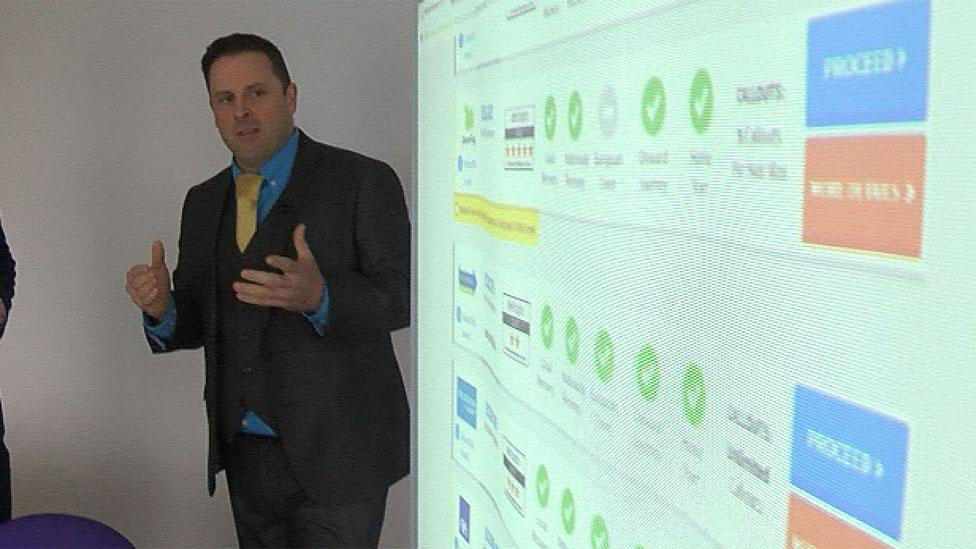Are Welsh schools teaching enough digital skills?
- Published

Pupils at Cardiff's Ysgol Gyfun Bro Edern using iPads in lessons
In the past, relative prosperity in Wales came from iron, coal and heavy industry - but where will we make money and improve our economy in the future?
Doing innovative things with data and technology is often called the "digital economy" - this week we are looking at what is being done to grow it in Wales.
Here, Prof Tom Crick, a computer scientist at Cardiff Metropolitan University, asks whether our children are being taught sufficient digital skills.


In 2011, I was asked by BBC Wales to report on why ICT lessons needed to change in Wales.
Back then I was campaigning to change the curriculum. We should not just develop consumers of technology in schools, but challenge pupils to be makers and creators.
The Welsh Government agreed with the recommendations of the panel I co-chaired in 2013, and now changes are starting to be made.
Something called the Digital Competency Framework gives advice to schools and teachers on how to incorporate digital skills across all subjects.
It could be how to stay safe online, how to share information, how to research and evaluate sources or solve a problem with basic programming code.

Pupils at Cardiff's Ysgol Gyfun Bro Edern use iPads in lessons
When I visited Crickhowell High School in Powys recently, head teacher Jackie Parker told me they had been planning for teaching more digital skills for several years.
Students Jenni and Mali both told me about how they had used tablets and laptops from primary school and now in their first year of high school more and more.
It is great to see this progress and talk to a head who agreed that digital skills are every bit as important now as reading or writing.
But the aim is for all schools to be effectively using technology every day to help pupils solve real-world problems.
A group of assembly members has already raised concerns about converting the vision of this new curriculum into something tangible in the classroom.
So why are these skills so important?

Businessman Simon Jones sees a disparity between skills pupils are taught and those they will need
Steve Jones runs a business in Cwmbran, Torfaen, which develops comparison websites.
He has an insurance industry background, but after jobs losses there he saw a gap in the market.
With so much data available from cars, drivers, phones and everywhere else in our lives, his business can create innovative new digital products and services.
But it can only do that with workers who are digitally-savvy - who can analyse data, write programs, interrogate sources.
He told me about the "big disparity" in terms of what his children are taught in school and what he feels they will need to work in a digitally-based business like his.
'Digital pitch'
Some countries have been pushing high-value digital skills at all levels of education for a number of years.
Professor Judith Gal-Ezer, a computer scientist from The Open University of Israel, was part of the curriculum review in Israel some 20 years ago when it started to focus on digital skills.
She said: "We then called it the new curriculum for computer science in high school and it was a kind of breakthrough. Digital skills is not an issue. It's there everywhere in schools."
My own University, Cardiff Met, has just announced plans for a new school of technologies to develop digital media, data science, and design.
Other universities are also looking to link better with industry to develop digital skills too.
So yes, we are improving the education system, but we also need the high-value jobs for people to go into rather than move elsewhere.
Now, more than ever, we need a coherent and long-term commitment from the Welsh Government for "Digital Wales", from skills to infrastructure and the wider digital ecosystem.
Other countries have made their "digital pitch" — from Israel to South Korea to Estonia - all do innovative things with data and technology.
What will be the unique selling point here in Wales, so we can compete in and ultimately lead these high-value digital industries?

A Welsh Government spokesman said in response: "Wales is already the fastest growing digital economy outside London, with a tech sector that employs some 40,000 people and is worth over £8bn in turnover to the Welsh economy
"The Welsh Government has invested in digital infrastructure to underpin this growth, with Superfast Cymru enabling over 630,000 premises throughout Wales to gain access superfast broadband."
He added: "We are also investing in future generations through exciting projects such as the National Software Academy, which uniquely brings business in to the classroom."
- Published21 September 2016

- Published13 June 2016

- Published19 October 2015

- Published3 September 2011